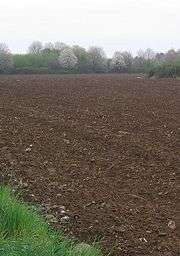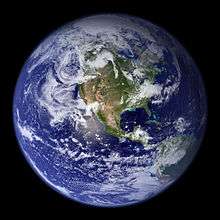Definify.com
Webster 1913 Edition
Earth
Earth
(ẽrth)
, Noun.
[AS.
eorðe
; akin to OS. ertha
, OFries. irthe
, D. aarde
, OHG. erda
, G. erde
, Icel. jörð
, Sw. & Dan. jord
, Goth. aīrþa
, OHG. ero
, Gr. [GREEK], adv., to earth, and perh. to E. ear
to plow.] 1.
The globe or planet which we inhabit; the world, in distinction from the sun, moon, or stars. Also, this world as the dwelling place of mortals, in distinction from the dwelling place of spirits.
That law preserves the
And guides the planets in their course.
earth
a sphereAnd guides the planets in their course.
S. Rogers.
In heaven, or
earth
, or under earth
, in hell. Milton.
2.
The solid materials which make up the globe, in distinction from the air or water; the dry land.
God called the dry land
earth
. Gen. i. 10.
He is pure air and fire, and the dull elements of
earth
and water never appear in him. Shakespeare
3.
The softer inorganic matter composing part of the surface of the globe, in distinction from the firm rock; soil of all kinds, including gravel, clay, loam, and the like; sometimes, soil favorable to the growth of plants; the visible surface of the globe; the ground;
as, loose
earth
; rich earth
.Give him a little
earth
for charity. Shakespeare
4.
A part of this globe; a region; a country; land.
Would I had never trod this English
earth
. Shakespeare
5.
Worldly things, as opposed to spiritual things; the pursuits, interests, and allurements of this life.
Our weary souls by
earth
beguiled. Keble.
6.
The people on the globe.
The whole
earth
was of one language. Gen. xi. 1.
7.
(Chem.)
(a)
Any earthy-looking metallic oxide, as alumina, glucina, zirconia, yttria, and thoria.
(b)
A similar oxide, having a slight alkaline reaction, as lime, magnesia, strontia, baryta.
8.
A hole in the ground, where an animal hides himself;
as, the
. earth
of a foxMacaulay.
They [ferrets] course the poor conies out of their
earths
. Holland.
☞ Earth is used either adjectively or in combination to form compound words; as, earth apple or earth-apple; earth metal or earth-metal; earth closet or earth-closet.
Adamic earth
, Bitter earth
, Bog earth
, Chian earth
Alkaline earths
. See under
– Alkaline
. Earth apple
. (Bot.)
(a)
A potato.
(b)
A cucumber.
– Earth auger
, a form of auger for boring into the ground; – called also
– earth borer
. Earth bath
, a bath taken by immersing the naked body in earth for healing purposes.
– Earth battery
(Physics)
, a voltaic battery the elements of which are buried in the earth to be acted on by its moisture.
– Earth chestnut
, the pignut.
– Earth closet
, a privy or commode provided with dry earth or a similar substance for covering and deodorizing the fæcal discharges.
– Earth dog
(Zoöl.)
, a dog that will dig in the earth, or enter holes of foxes, etc.
– Earth hog
,
Earth pig
(Zoöl.)
, the aard-vark.
– Earth hunger
, an intense desire to own land, or, in the case of nations, to extend their domain.
– Earth light
(Astron.)
, the light reflected by the earth, as upon the moon, and corresponding to moonlight; – called also
earth shine
. Sir J. Herschel.
– Earth metal
. See 1st
– Earth
, 7. (Chem.)
Earth oil
, petroleum.
– Earth pillars
or
Earth pyramids
(Geol.)
, high pillars or pyramids of earth, sometimes capped with a single stone, found in Switzerland.
Lyell.
– Earth pitch
(Min.)
, mineral tar, a kind of asphaltum.
– Earth quadrant
, a fourth of the earth’s circumference.
– Earth table
(Arch.)
, the lowest course of stones visible in a building; the ground table.
– On earth
, an intensive expression, oftenest used in questions and exclamations;
as, What
. on earth
shall I do? Nothing on earth
will satisfy him[Colloq.]
Earth
,Verb.
T.
[
imp. & p. p.
Earthed
; p. pr. & vb. n.
Earthing
.] 1.
To hide, or cause to hide, in the earth; to chase into a burrow or den.
“The fox is earthed.” Dryden.
2.
To cover with earth or mold; to inter; to bury; – sometimes with up.
The miser
Watching the mole, half beggars him ere noon.
earths
his treasure, and the thief,Watching the mole, half beggars him ere noon.
Young.
Why this in
earthing
up a carcass? R. Blair.
Earth
,Verb.
I.
To burrow.
Tickell.
Earth
,Noun.
[From
Ear
to plow.] A plowing.
[Obs.]
Such land as ye break up for barley to sow,
Two
Two
earths
at the least, ere ye sow it, bestow. Tusser.
Webster 1828 Edition
Earth
EARTH
,Noun.
1.
Earth, in its primary sense, signifies the particles which compose the mass of the globe, but more particularly the particles which form the fine mold on the surface of the globe; or it denotes any indefinite mass or portion of that matter. We throw up earth with a spade or plow; we fill a pit or ditch with earth; we form a rampart with earth. This substance being considered, by ancient philosophers, as simple, was called an element; and in popular language, we still hear of the four elements, fire, air,earth, and water.2.
In chimistry, the term earth was, till lately, employed to denote a simple elementary body or substance, tasteless, inodorous, uninflammable and infusible. But it has also been applied to substances which have a very sensible alkaline taste, as lime. The primitive earths are reckoned ten in number, viz, silex, alumin, lime, magnesia, baryte, strontian, zircon, glucin, yttria and thorina. Recent experiments prove that most or all of them are compounds of oxygen with bases, some of which appear to possess the properties of metals. In this case the earths are to be considered as metallic oxyds.3.
The terraqueous globe which we inhabit. The earth is nearly spherical, but a little flatted at the poles, and hence its figure is called an oblate spheroid. It is one of the primary planets, revolving round the sun in an orbit which is between those of Venus and Mars. It is nearly eight thousand miles in diameter, and twenty five thousand miles in circumference. Its distance from the sun is about ninety five millions of miles,and its annual revolution constitutes the year of 365 days, 5 hours, and nearly 49 minutes.4.
The world, as opposed to other scenes of existence.5.
The inhabitants of the globe.The whole earth was of one language. Gen.11.
6.
Dry land, opposed to the sea.God called the dry land earth. Gen.1.
7.
Country; region; a distinct part of the globe.In this sense, land or soil is more generally used.
In scripture, earth is used for a part of the world. Ezra. 1.2.
8.
The ground; the surface of the earth. He fell to the earth. The ark was lifted above the earth.In the second month--was the earth dried. Gen.8.
9.
In scripture, things on the earth, are carnal, sensual, temporary things; opposed to heavenly, spiritual or divine things. 10. Figuratively, a low condition. Rev.12.
11. [from ear, L. aro, to plow.] The act of turning up the ground in tillage. [Not used.]
EARTH
,Verb.
T.
The fox is earthed.
1.
To cover with earth or mold.EARTH
,Verb.
I.
Definition 2026
Earth
Earth
See also: earth
English

Earth's astronomical symbol

The Earth
Proper noun
Earth
- The third planet in order from the Sun, upon which humans live. Represented in astronomy and astrology by ♁ and ⊕.
- 2013 May 11, “The climate of Tibet: Pole-land”, in The Economist, volume 407, number 8835, page 80:
- Of all the transitions brought about on the Earth’s surface by temperature change, the melting of ice into water is the starkest. It is binary. And for the land beneath, the air above and the life around, it changes everything.
-
Usage notes
Quotations
- For usage examples of this term, see Citations:Earth.
Synonyms
- (third planet from Sun): Earth Mother, Gaia, globe, Mother Earth, Sol III, Tellus, Terra, world
Hypernyms
Hyponyms
Derived terms
Terms derived from Earth
Related terms
Related terms
|
|
|
|
Translations
third planet from the Sun
|
|
See also
- (planets of the Solar System) planets of the Solar System; Mercury, Venus, Earth, Mars, Jupiter, Saturn, Uranus, Neptune
- (moons of Earth) Luna/Moon/moon [edit]
- ♁, ⊕
External links
Anagrams
earth
earth
See also: Earth
English
Proper noun
the earth
- Our planet, third out from the Sun; see main entry Earth.
- The astronauts saw the earth from the porthole.
Usage notes
Translations
our planet, third out from the Sun — see Earth
Noun

Earth as soil (1)

A view of Earth from space
earth (countable and uncountable, plural earths)
- (uncountable) Soil.
- This is good earth for growing potatoes.
- (uncountable) Any general rock-based material.
- She sighed when the plane's wheels finally touched earth.
- The ground, land (as opposed to the sky or sea).
- 2013 June 7, David Simpson, “Fantasy of navigation”, in The Guardian Weekly, volume 188, number 26, page 36:
- Like most human activities, ballooning has sponsored heroes and hucksters and a good deal in between. For every dedicated scientist patiently recording atmospheric pressure and wind speed while shivering at high altitudes, there is a carnival barker with a bevy of pretty girls willing to dangle from a basket or parachute down to earth.
- Birds are of the sky, not of the earth.
-
- (Britain) A connection electrically to the earth ((US) ground); on equipment: a terminal connected in that manner.
- A fox's home or lair.
- The world of our current life (as opposed to heaven or an afterlife).
- 1819, John Keats, "Ode on a Grecian Urn"
- "Beauty is truth, truth beauty," - that is all / Ye know on earth, and all ye need to know.
- 1819, John Keats, "Ode on a Grecian Urn"
- (alchemy) One of the four basic elements.
- (India and Japan) One of the five basic elements.
- (Taoism) One of the five basic elements.
Derived terms
terms derived from "earth"
|
|
|
Translations
soil
|
|
any general rock-based material
|
|
the ground, land
|
|
electrical connection
|
|
fox's lair
world of our current life, as opposed to afterlife
one of the four basic elements
|
|
one of the five basic elements
|
|
See also
Verb
earth (third-person singular simple present earths, present participle earthing, simple past and past participle earthed)
- (Britain) To connect electrically to the earth.
- That noise is because the amplifier is not properly earthed.
- To bury.
- Young
- The miser earths his treasure, and the thief, / Watching the mole, half beggars him ere noon.
- Young
- (transitive) To hide, or cause to hide, in the earth; to chase into a burrow or den.
- Dryden
- The fox is earthed.
- Dryden
- To burrow.
- (Can we find and add a quotation of Tickell to this entry?)
Synonyms
- (to connect electrically to the earth): (US) ground
Translations
connect electrically to the earth
|
|
to bury
|